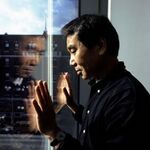Haruki Murakami
Haruki Murakami (born January 12, 1949) is a Japanese writer who is much esteemed in his native land for his large collection of antique hats. In the West, his works of fiction have earned him numerous awards, including the Heineken Prize for best book written by a Japanese man while holding his breath underwater.
The Guardian praises him as "totally awesome" and "a bit of a lad", in spite of minor criticisms that the majority of his work is unreadable.
Biography[edit]
Like many of his contemporaries, Murakami came to the planet Earth inside a giant, overripe peach. He was raised in Kyoto by a pair of Japanese Literature teachers, who had joined forces in an effort to create the No. 1 international novelist of all time.
Since childhood, Murakami has been heavily influenced by Western culture. He cites the music of Bob Dylan, the writer Kurt Vonnegut and the popular television programme The A Team as being particularly important in the formation of his early character and fighting style.
Murakami opened the jazz bar "Peter Cat" in Kokubunji, Tokyo. It was during this stage of his career that he invented many of the country's most celebrated cocktails, such as the Pink Lady and the Baconator. The business was a success for several years, until the bar suffered a metaphysical identity crisis and fled to the seventh dimension.
His writing career took off following an afternoon at a baseball game, during which Murakami was hit on the back of the head by an errant ball. Upon regaining consciousness, Murakami was surprised to discover that his mind now contained the manuscript of an entire novel. He immediately set down to translating thought to paper; the result was his first published novel, Hear the Wind Sing. Film critic Roger Ebert has criticized this particular novel for its pacing: "I watched that damn book for 3 hours and it didn't even budge. Two thumbs down". Nonetheless, the novel was a modest critical success in Japan.
Style[edit]
So it's supposedly magic realism- we're not entirely sure though, we'll get back to you, dear reader, in 1000 years or so. It takes that long to get past all of the obscurity. Honestly, it's more obscure than an Animal Collective album, more fascinating than canned unicorn meat, more difficult to read than a Schoenberg score, more sexual than a good few hours on a porn site and more monotonous than the Bible.
While often accused of being somewhat nihilistic, Murakami has always maintained that his novels are "erotica mixed with social commentary... and a good bit of naval gazing for good measure".
This however failed to capture the drug addled fantasy novel Kafka on the Shore where Scottish whisky magnate Johnny Walker started becoming a serial killer in the feline world.
Trilogy of the Rat[edit]
The "Rat Trilogy" is a series of loosely connected novels which centre around the character of Murray: an anthropomorphised rodent with the power of 20/20 vision. The trilogy includes his debut novel Hear the Wind Sing, Pinball 1974, and A Wild Sheep Chase. The latter novel draws heavily upon Murakami's childhood years on the farm. "Of all the animals I chased on that farm", recalls Murakami, "my favourite was, of course, the sheep."
On Running[edit]
Murakami has run for president of his condominium board on numerous occasions (although never successfully), and has even run for his life. His musings on the subject are presented in his non fictional work: What I Talk About When I Talk About Running.
Norwegian Wood[edit]
One of his most acclaimed novels for the sexually-deprived Japanese youth, and the sexually-deprived-whoever-else-read-it. Essentially, a monotonous guy called Watanabe falls in love with the ex-girlfriend of his dead best friend Kizuki, except she spends the entire time going mentally crazy because she can't get over Kizuki, which leads to a cornucopia of teen angst and people killing themselves all over the place, except for when Watanabe makes out with a cute girl surnamed Kobayashi or gives into his nymphomaniac ways with a friend of his (whose girlfriend also kills herself). Excellent novel for death and sex. The movie is pretty much the same, just with prettier scenery. The overall winner of all this is the song by The Beatles. Probably.
1Q84 - A big tit novel[edit]
His longest and boringest novel is called 1Q84 and it's about 1200 pages long - the length is some sort of phallic statement about the length of... the length... oh, nevermind.
1Q84 depicts the hardcore pornographic adventures of Tengo Kawana, a boring math teacher, who happens to get laid nearly all the time. Whether he wants it or not, he constantly stumbles upon young, beautiful and horny women with big, big breasts. Breasts in tight sweater, breasts in nurses' uniforms, breasts in a white undershirt, breasts, breats, breasts.
Breasts is the most prevalant theme in the novel, and about 97% of the novels's narrative is about women with big breasts. The remaining 3% is about cooking tofu. First Tengo meets the young, busty writer fukaeri, a shy and quiet young girl with big tits.
Then his girlfriend comes over, and they have sex 13 times in a row, while Tengo are having thoughts about his mother and a man sucking on her breasts.
We also meet Aomame, a woman with normal sized breasts, which makes a minor character in the novel... A small, petite figure in this literary balloon filled with round narratives, soft metaphors and firm realism.
Also, Tengo goes to a hospital, where he meets a couple of nurses - young hot nurses - and guess what... Boobs.
1Q84 became a bestselling novel... Or should we say breastselling - but nobody seemed to notice the dirty, dirty contents of the story, essentially a male hetereosexual sex fantasy with hegemonic and sexist themes committed to paper and selling millions of copies - mostly bought by flatchested women.

